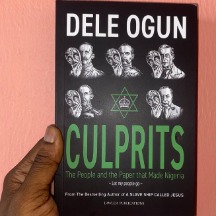Background Info:
"Culprits" is an original study of the history of the modern world with Africa
center stage, including the author Dele Ogun's assertion that American President Franklin Roosevelt was the real driver of decolonization in Africa. Ogun said that a commitment to the liquidation of the British Empire was the price Roosevelt extracted from Britain's wartime Prime Minister, Winston Churchill, for American entry into World War II and that the Atlantic Charter of August 14, 1941, reflects the deal by which the two leaders pledged self-determination for all colonized peoples.
The statement which set out American and British goals for the world after the end
of World War II was issued months before Japan bombed Pearl Harbor on December 7,
1941, with the US officially entering the War the following day.
Contrary to the impression created by Harold Macmillan's "Winds of Change" speech of February 3, 1960 – of a moral turnaround being the spur for decolonization - Churchill had already made the commitment to Roosevelt in 1941 because he had been ready to do anything, claims the Nigerian-born lawyer and historian, to bring America into the Second World War, including using his daughter-in-law to influence American policy.
Implementation of the Atlantic Charter deal was only delayed by Roosevelt's untimely death weeks before the end of the War and by the onset of the Cold War.
A Special Relationship
“Churchill told me that he was not His Majesty’s Prime Minister for the purpose of presiding over the dissolution of the British Empire …”
- Franklin Delano Roosevelt
January 21st, 1936, King George V dies. His dying words were: “How is the Empire?”207 His son and heir, King Edward VIII, cared more for one Mrs Wallis Simpson, an American divorcee in the middle of divorce proceedings against her second husband.
The British monarchy had come a long way since the days of Henry Tudor, the only other sovereign to have worn the number VIII jersey. In the new age, a king could be forced by his subjects, at the instigation of the press and the Church of England, to choose between his kingdom and his intended.
|
On December 10th, 1936, Edward VIII made his choice. He chose Mrs. Simpson. He renounced the throne and all that came with it, including the British Empire. His younger brother, Albert, took over, becoming ‘King George VI’ and bringing his daughter, the future Queen Elizabeth II, onto the centre stage of world history with Edward being relegated to the backstage as ‘Duke of Windsor’.
Americans had broken free of the British monarchy when they declared their independence on July 4th, 1776. Since that date, no reigning sovereign had set foot in the country. The visit of King George VI on June 9th, 1939, to US President Franklin Delano Roosevelt, was a first.
Avery Harriman, her highly influential target, and a man of stupendous wealth, was not averse to action to cement the British and American relationship:
… As they watched Selfridges department store succumbing to fire, Averell invited her to his palatial lower floor suite ‘so we can talk a little easier’… As the bombs whined and crashed, Averell was peeling off that gorgeous golden dress. While the building quivered from the worst raid in London to date and shrapnel rattled down onto the streets, Pamela lay naked in the arms of the man who might be able to bring the horror to an end… This was a strategic alliance of the highest order and could be vital to helping Winston in saving the country. But it amounted to much more than the act of seduction.
The special relationship thus consummated was known to both principals, Churchill and Roosevelt. The latter took special delight in the development: Largely paralysed below the waist from polio, the President still had a roving eye for beautiful women and relished saucy gossip. His cigarette aloft in a long holder at the corner of his mouth, FDR [Roosevelt] got a ‘big kick’ when Hopkins informed him about Pamela’s affair with Averell… he was tickled by the idea of his emissary in London ‘bedding his ally/ rival’s daughter-in-law’ and eager to know more.
Power had shifted from the former colonial master to the former colonial subject. The change in the hierarchy had been coming since the American intervention on the British side in the First World War. That had been the first step in a sequence that would see the rebel colony end up in control of the fate of the formal British Empire. From the end of the First World War in 1918 it had been American finance keeping the heart of the Empire beating. This life support function had been maintained through the Great Depression of 1929. It, however, came at a price.
Ogun is also author of
"A Slave Ship Called Jesus"








